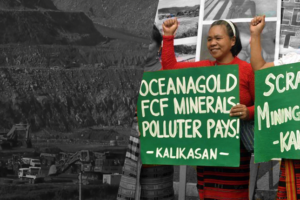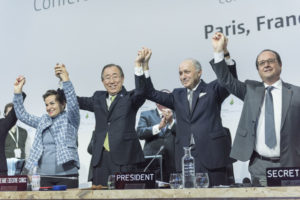Reportage from UNFCCC COP18 in Doha
Climate, Number 4
[[{“type”:”media”,”view_mode”:”media_large”,”fid”:”58″,”attributes”:{“alt”:””,”class”:”media-image”,”height”:”71″,”style”:”font-size: 12px; width: 310px; height: 71px; margin: 10px; float: right;”,”typeof”:”foaf:Image”,”width”:”310″}}]]
US chides NGOs, outlines its positions not based on need
DOHA, November 30, 2012 — The US chief negotiator at COP-18 issued a strong rebuke to NGOs in an off-the-record meeting, which has now been published in Indian media.
Jonathan Pershing told NGOs they should recognize that the US makes it possible for them to be present at COP-18. And while many parties and NGOs at COP-18 are calling for agreements based on science, Pershing said that US positions are not based on the reality of “what is needed”. He went on to rubbish the concept of sharing atmospheric space, underlining that US positions are based on what can be sold to the US Congress.
"We are one of the funders to make it possible for you to be at the table,” Pershing told NGOs present in the meeting. “I hope you recognize that many of you who come to the meetings you do, the US fights for you at every chance to give you a chance to be in this room."
In what could be considered an arrogant aside, Pershing noted that not all Parties agree with the US: "What we also think is the participation of a lot of countries out there includes the ones that disagree with us."
Pershing, who made news in the run-up to COP-18 with the claim that the US should be recognized for its “enormous” efforts on climate change, proceeded to dismantle a concept drawn from the UNFCCC foundational principle of equity – the sharing of atmospheric space.
"It's a vision [in which] you can say that the atmosphere can take an X quantity of coal emissions and therefore what you do is you divide that number into percentages,” he said.
“The obligation it states is that you [the US] would have to reduce emissions down to negative 37% [below 1990 levels]. And the obligation of China will be a tiny bit, but India can still grow quite a lot. The politics of that quite frankly really don't work. I can't really sell that to the US Congress."
Pershing underscored that for the US the defining principle of agreements it reaches must be whether they can be “sold at home”.
He said: "One way to think about it is what you could deliver. You say what you are going to do and you will be held to that. So how do you marry the reality of what you are doing with the reality of what is needed. To me, it's going to be a hybrid. It's going to be something between those two."
He added: "Because if we can't take it home and sell it at home, in whatever political economy we are living in, we won't do it."
Pershing’s comments will further the perception of US intransigence to developing country positions in negotiations based on compromise. Developing country groupings including the G77/Africa, the Least Developed Countries (LDCs), the Alliance of Small Island States (AOSIS), and BASIC (Brazil, India, South Africa and China) have all stressed that a legally binding second commitment period (CP2) of the Kyoto Protocol—which would ensure that industrialized countries and economies in transition commit to further carbon emission reductions—is a cornerstone for ambition in COP-18 and combatting climate change. However, the US, along with Japan, Russia, Canada and New Zealand have pulled out of CP2 in favor of a “pledge and review” system.
Pershing criticized the role of the UN after COP-15 in Copenhagen. After complaining that “it seemed like we didn’t sleep for two weeks,” he credited the role of leading economies led by the US for progress in the talks.
"I am not sure that any of us are particularly confident that the UN managing the near-term financing is the right way to go," he said.
The Guardian newspaper reported that Pershing suggested the forum offered by the UN was important for countries such as Cuba or the small islands to air their grievances.
Pershing was sworn in as Deputy Special Envoy for Climate Change on March 19, 2009. He is a former director of the Climate, Energy and Pollution Program at the World Resources Institute (WRI), a US-based think tank, and he also directed the Environment Program at the International Energy Agency, in Paris. ###
_______________________________________________________________
IBON International will co-host a COP 18 side event “Promoting the Busan Building Block on Climate Finance and Development Effectiveness” on December 1, 2012, from 18.30 – 20.00, in Side Event Room 7, Qatar National Convention Centre, Doha, Qatar.

![[WEBINAR] Towards a more inclusive and sustainable climate financing](https://iboninternational.org/wp-content/uploads/2023/05/AFDB-Side-Event-IA-Final-scaled-300x200.jpg)


